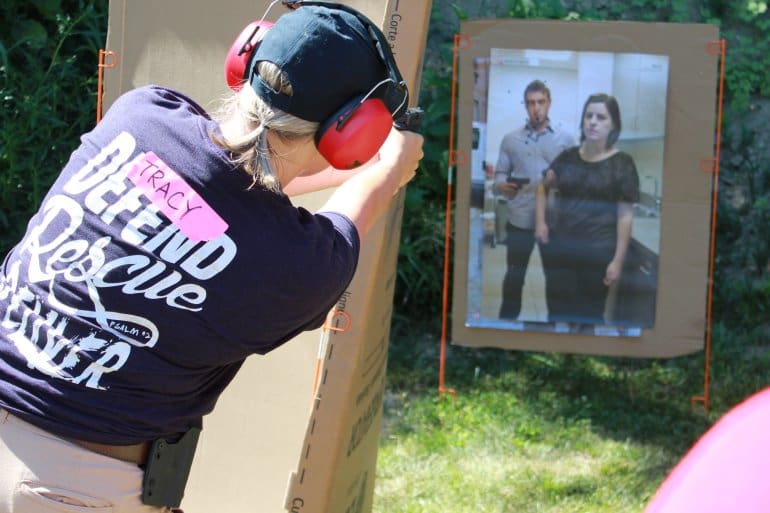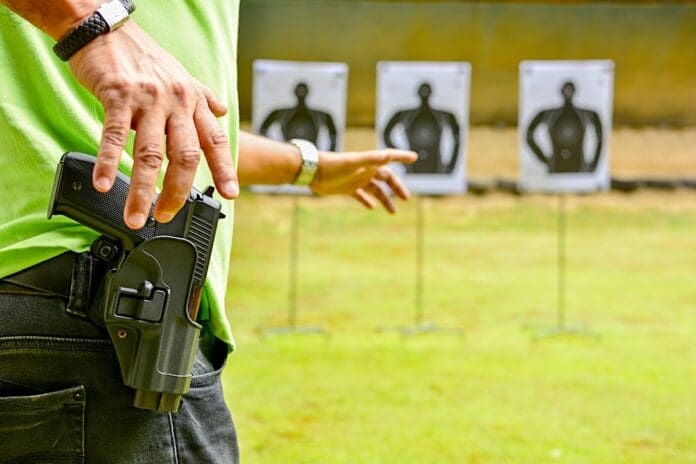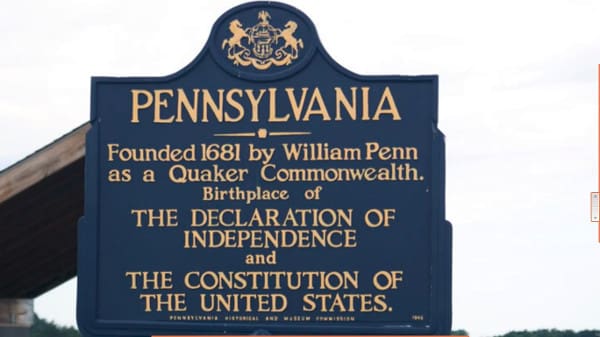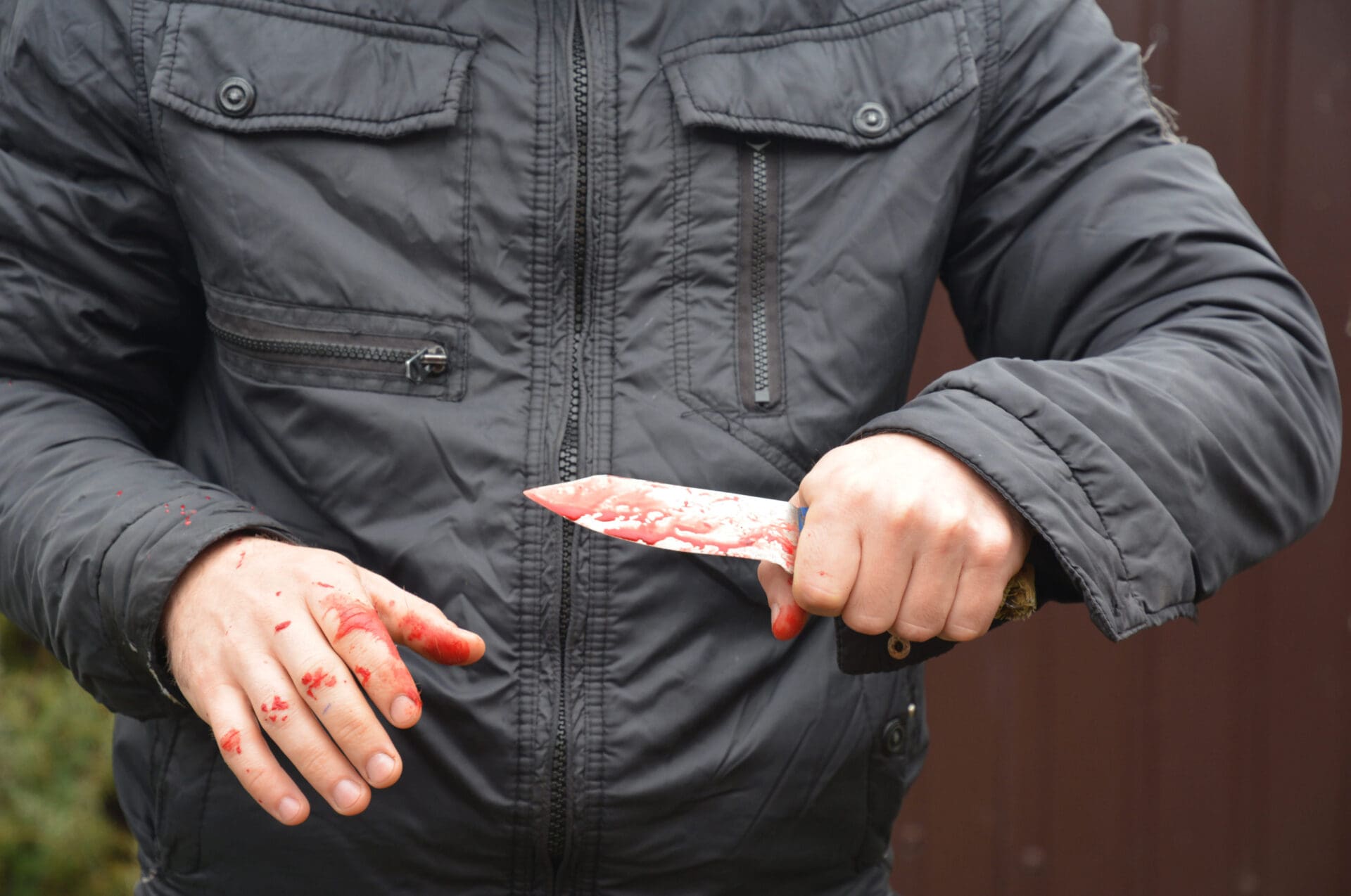By Fred Mastison
As responsible firearms owners, many of us spend significant time and money honing our shooting skills—all with the hope of only having to press the trigger on the range and nowhere else. That can sometimes leave us lacking in the necessary mental skillset department.
While you may practice hundreds of draws, and dry-fire thousands of times, have you practiced calling 911 and then talking to the police?
That kind of scenario-based training is something that can help build a skill that is critically important and desperately needed in the stressful moments following a defensive gun use. Don’t dismiss this as “overboard” or “silly.” In fact, I believe it’s every bit as important as the fundamentals of shooting.

A sample scenario to practice would be engaging one target. You use verbal commands, telling the attacker to stop. Once you feel it’s necessary, you fire your gun. You do your after-action scan of the environment to make sure there are no other threats.
Check the subject one more time, then place a pretend call to 911. Tell them you need help and that you are the victim. Provide your location and then…stop talking.
Now, it will be helpful to have a training partner to assist you. They can play the role of the police officer and should ask you very open-ended questions like, “What happened?” They should even badger you a little to the point of annoyance to up your stress level.
Your job in this kind of training is to be disciplined and provide a simple statement along the lines of, “I really don’t want to say anything until I have had time to calm down and talk to my attorney.”
Encourage your partner to probe for more information but hold your ground. Repeat that sentence above as many times as necessary. While this kind of practice may seem a bit melodramatic, it’s an excellent way to practice what will be one of the most difficult conversations of your life. Train hard and train smart.
As an attorney I know once said, everyone has the right to remain silent, but very few have the ability to do so. Practice it often until it’s as second-nature as your draw from concealment.
For more training tips or to learn more about the legal aspects of firearms ownership and use, visit uslawshield.com.





…”have you practiced calling 911….?”
Yes. I have rehearsed my script for both 911 and for when the blue team arrives. For the Blues, a short statement of necessity and nothing else without my lawyer (if those Shakespearean guys haven’t killed him, along with all the others).
I can tell you from experience, dont talk to the PoPo unless your goal is to be handcuffed in the back of the cruiser for a trip downtown. They wont give you the benefit of the doubt.
“I can tell you from experience, dont talk to the PoPo unless your goal is to be handcuffed in the back of the cruiser for a trip downtown.”
There’s a very good chance you’re going downtown simply as a matter of that police department’s policy whether you want to or not… 🙁
AQ, depends on the officer/agency. Back in the dark days when Florida didn’t have shall issue my dad worked for FHP. When I was discharged from the Army my dad gave me a copy of an official FHP memo to keep in my truck. It outlined different ways in which a loaded handgun may be carried in a vehicle. The memo concluded by saying if the trooper had any doubts about the legality of the situation it was to be resolved in favor of the citizen. As for myself, you had to step on your dick pretty had for me to seize a firearm. That usually meant a major felony. When I taught a CCW class I would have my students memorize a simple statement, “Officer, I want to cooperate with your investigation. However, I decline to answer any questions or make any statements until I have spoken with an attorney.”
Yea i had had pretty good experiences with the Po up until the last one. Wasnt firearms related, so yea I shouldn’t really speak for that
If you are involved in a shooting incident, the best thing to do is NOT TALK TO THE POLICE until you have consulted with an attorney who PRACTICES criminal law and is present with you during the “interview”/interrogation. At NO time should you speak to the police without a qualified criminal law attorney there in the room with you. In other words, keep yours big mouth shut!
Silence is golden and may save you a headache later.
A real eye opener for me was going thru a training class several years ago, which used a large Mylar mirror downrange to create the illusion that the people who actually were about 15’ to your left (screened so that you could not see them directly) were in front of you. They’d then run a scenario where you used your carry piece and live ammo, and shooting (if warranted) at the self-healing mirror (video camera close to the trainee’s POV allowed the trainer to assess how accurate your shots were). No pain penalty like you’d have from true FoF, but it still created more than enough stress to trigger the usual symptoms of tunnel vision, auditory exclusion, loss of fine motor control, etc.
But the main thing was that they videoed you from multiple angles, and you were expected do what you would actually have done in the situation, including verbal commands, getting behind cover/concealment, tactical reloads, etc. Immediately after the scenario ended, a different trainer took you into a room where you were lightly interrogated, on pretty easy questions (how many shots? what kind of weapon? etc.), and then shown the video.
Even though I knew, as a lawyer, to be “careful” with my answers, there were lots of answers that I was “certain” were the truth and thus would be no issue answering correctly . . . but the video conclusively proved otherwise.
Moral of the exercise was that psychologically and psychologically, you get gaps in your perception / memory when under stress, and your mind compensates by “filling in the gaps.” So you THINK you remember things about the incident, when in fact you may not . . . which gives the popo all sorts of opportunities to think you are lying if they have conflicting accounts (or to trap you if they just want to nail you).
It taught me that you want to have your “I’ll cooperate with your investigation after my attorney is present” lines down, and then STFU.
That sounds like a fascinating and valuable exercise. Do you happen to remember the name of the class? If they’re still around and not too far from me I might have to find time to go see them
Here are TTAG writeups on it (I took the class with Dan, Leghorn, RF, and others).
https://www.thetruthaboutguns.com/ttag-meet-up-at-atlas-self-defense-course-real-guns-real-bullets-real-people-march-26-best-of-the-west-liberty-hill-tx/
https://www.thetruthaboutguns.com/atlas-defenses-nightmare-box-training-real-life-scenarios/
Their website is still up, so they may still be in business.
Here’s the website for the company that invented the system that Atlas Defense was using:
http://troysgate.com/training.html
They are in NC and offer civilian classes. They probably ID other companies who they have licensed to use the system.
Another article that describes classes with the Troysgate system:
https://freebeacon.com/culture/realistic-gun-training-possible/
I’ve done all sorts of training classes, including FoF. But this one taught me stuff that is now seared into my brain. Highly recommended.
Worth noting. IMO – the curriculum should be tailored to your state’s legal terrain…
You fight the way you train. If your training is nothing but static semi-casual shooting from fixed distances and limited positions, that is how you react under stress. If you learn and continue to practice shooting from around cover, realistic positions like a crouch or with a single hand around an object or with the off hand holding a bag, or a dummy in place of a child, you can gain some confidence in your defensive abilities.
Using a shot timer, and if possible moving between shots, is also useful in training.
Dealing with law enforcement after a shoot is something else to consider. Even if it is a clear case of self defense, always ask to consult an attorney and have them present in answering any questions or making any statements. Even in a friendly jurisdiction there may well be a prosecutor with a mad for you or against anyone involved in any kind of shooting. Justified or not.
LKB above describes a training course he (just a guess) experienced. Training under stress and giving/writing an after action report is very good to learn/practice. Both physical and mental/emotional stress can cloud judgement and affect abilities. Training can reduce those effects to a large percent.
I’m surprised that y’all aren’t arguing about that holster choice. I expect better from this comments section.
Why in Heaven’s name would you show anyone still using a Serpa-style holster with an index finger retention release? Those things have caused plenty of NDs and they’re routinely banned by reputable trainers.